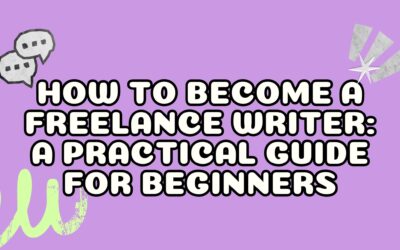Starting a freelance writing career can be an exciting yet daunting journey, especially if you’re starting with little to no experience.
Trust me, I’ve been there. In fact, my dad took me out for lunch and told me I was making the biggest mistake of my life when I quit my job to move to Spain and start my career as a freelancer.
I had a background in marketing, but I’d never worked with clients before. I didn’t freelance on the side of my 9-5 and I didn’t know any other freelancers. I basically dived headfirst straight into the deep end.
So, how can you get freelance writing jobs with no experience?
1. Find and embrace your USP
When I first dipped my toes into freelance writing, I had no formal experience or qualifications to boast about. Instead, I leaned into what made me unique – my perspective and voice. Whether you’re a passionate hobbyist, a keen observer of life, or someone with niche interests, embrace what sets you apart. Your distinct viewpoint can be your greatest asset in capturing the attention of potential clients.
I’d been running a travel blog for a couple of years, so I used this to my advantage. My first gig was writing hotel descriptions for a brand I found via Craiglist. When I applied, I talked about my blog and my love of travel, which I think helped me win the role.
This project not only kickstarted my career but also gave me confidence in my ability to leverage my unique perspective to land writing jobs.
Your USP might be:
- Previous experience you’ve gained in past roles
- An interest or hobby you have outside of work
- A specialist skill that not a lot of other people have (like crocheting tiny animals or writing code)
2. Build a Solid Portfolio
Without formal experience, a strong portfolio serves as your calling card in the freelance writing realm. Start by creating sample pieces that showcase your writing style, versatility, and expertise in specific topics or niches. Whether it’s blog posts, articles, product descriptions, or social media content, curate a portfolio that demonstrates your capabilities to potential clients.
Here are a few ways you can kickstart your portfolio:
- Write on-spec pieces: Write yourself a brief and get to work. Imagine you’re working for a real client and creating a blog post, homepage copy, or a sales page.
- Guest write for other sites: Search Google for “write for us” + “your niche” and find sites that accept guest posts. This is a great way to get actual published work in your portfolio.
- Start a blog: I only had a blog as a sample piece when I started. But I’d published enough content to show I could actually string a sentence or two together.
- Offer a one-off free project: this is my least favourite option, but it can work. Offer your services for a reduced rate (or for free) and create a piece of content for a real company.
I began by writing for free or at nominal rates for various online platforms, blogs, and community newsletters. While these early projects didn’t offer monetary rewards, they provided invaluable opportunities to refine my skills, receive feedback, and gradually assemble a portfolio that showcased my evolving talent.
3. Network and Seek Opportunities
Freelancing is competitive — you have to put yourself out there. And, while the introvert in me hated the idea of mingling with other people, awkwardly holding a glass of wine in one hand, and regurgitating a cringe-y elevator pitch, networking really changed things for me.
But you don’t have to go all in on networking in the traditional sense. Instead, connect with fellow writers, editors, and industry professionals through online forums, social media platforms, and networking events. Actively participate in writing communities, contribute guest posts, and engage in discussions to expand your network and visibility within the industry.
Networking played a pivotal role in my journey as a freelance writer. I joined online writing groups, attended workshops, and actively engaged with professionals in the field. Through these connections, I discovered hidden job opportunities, received referrals, and gained valuable insights into the industry. Remember, every interaction is an opportunity to showcase your passion and expertise.
Here are some ways you can start networking without feeling icky about it:
- Go to a local coworking space and attend their events for freelancers
- Join an online coworking community to meet other freelancers
- Join Slack or Facebook groups where content leads hang out
- Start introducing yourself to people on LinkedIn (one-to-one networking is great! Ask people if they want to grab a virtual coffee)
4. Invest in Continuous Learning
The online writing world is constantly evolving, and as a freelance writer, it’s essential to stay on top of industry trends, best practices, and emerging technologies.
Invest in your professional development by enrolling in writing courses, attending webinars, and reading books on writing craft and business strategies. Continuous learning not only enhances your skills but also positions you as a knowledgeable and competent writer in the eyes of clients.
Recognising the importance of continuous learning, I dedicated time and resources to expand my knowledge and skill set. From mastering SEO techniques to refining my storytelling abilities, I embraced opportunities to enhance my writing proficiency. This commitment to learning not only elevated the quality of my work but also opened doors to higher-paying gigs and prestigious clients.
5. Lean On Your Existing Network
One of my very first freelance clients was my old employer. They weren’t my first (that came from Craigslist back in the day), but they were one of the first.
As soon as I quit my job, I let everyone I know that I was looking to pick up jobs. I told family and friends and sent a few emails to people who I thought might be interested in working with me.
The first step to landing freelance writing jobs when you have precisely zero experience is to let people know. How can people hire you if they don’t know that you’re available for hire?
Here’s what you can do:
- Share your new freelance status with friends and family and prompt them to get in touch if they need any of your services
- Reach out to past employers (if you were on good terms)
- Send a message to businesses in your local community
You don’t need tons of experience to get freelance writing jobs
Breaking into freelance writing without prior experience may seem daunting, but it’s certainly achievable with the right mindset and approach.
Embrace your unique perspective, build a solid portfolio, network with industry professionals, and invest in continuous learning. Remember, every small step you take towards your writing goals brings you closer to realising your aspirations in the dynamic world of freelance writing. So, dare to dream, persevere through challenges, and let your passion for writing propel you towards success.






0 Comments